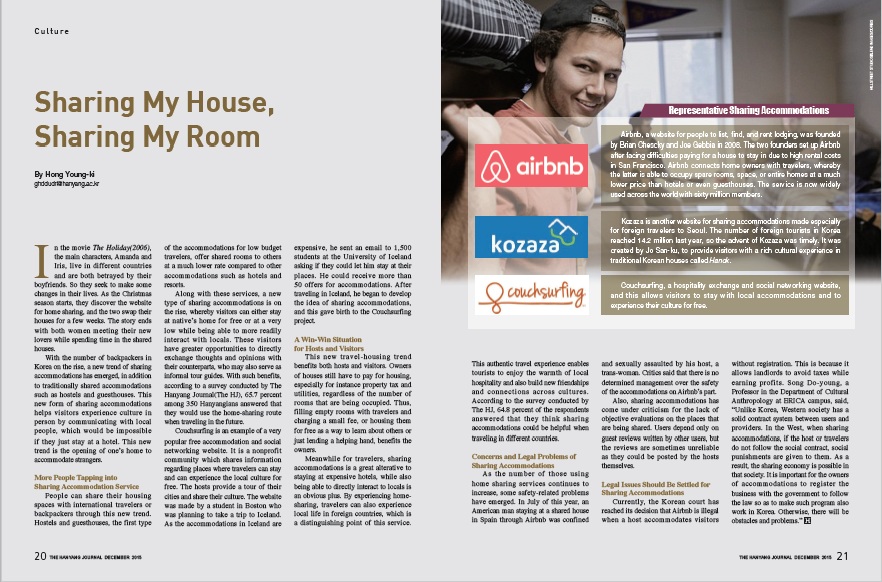
In the movie The Holiday(2006), the main characters, Amanda and Iris, live in different countries and are both betrayed by their boyfriends. So they seek to make some changes in their lives. As the Christmas season starts, they discover the website for home sharing, and the two swap their houses for a few weeks. The story ends with both women meeting their new lovers while spending time in the shared houses. With the number of backpackers in Korea on the rise, a new trend of sharing accommodations has emerged, in addition to traditionally shared accommodations such as hostels and guesthouses. This new form of sharing accommodations helps visitors experience culture in person by communicating with local people, which would be impossible if they just stay at a hotel. This new trend is the opening of one’s home to accommodate strangers.
More People Tapping into Sharing Accommodation Service
People can share their housing spaces with international travelers or backpackers through this new trend. Hostels and guesthouses, the first type of the accommodations for low budget travelers, offer shared rooms to others at a much lower rate compared to other accommodations such as hotels and resorts. Along with these services, a new type of sharing accommodations is on the rise, whereby visitors can either stay at native’s home for free or at a very low while being able to more readily interact with locals. These visitors have greater opportunities to directly exchange thoughts and opinions with their counterparts, who may also serve as informal tour guides. With such benefits, according to a survey conducted by The Hanyang Journal(The HJ), 65.7 percent among 350 Hanyangians answered that they would use the home-sharing route when traveling in the future. Couchsurfing is an example of a very popular free accommodation and social networking website. It is a nonprofit community which shares information regarding places where travelers can stay and can experience the local culture for free. The hosts provide a tour of their cities and share their culture. The website was made by a student in Boston who was planning to take a trip to Iceland. As the accommodations in Iceland are expensive, he sent an email to 1,500 students at the University of Iceland asking if they could let him stay at their places. He could receive more than 50 offers for accommodations. After traveling in Iceland, he began to develop the idea of sharing accommodations, and this gave birth to the Couchsurfing project.
A Win-Win Situation for Hosts and Visitors
This new travel-housing trend benefits both hosts and visitors. Owners of houses still have to pay for housing, especially for instance property tax and utilities, regardless of the number of rooms that are being occupied. Thus, filling empty rooms with travelers and charging a small fee, or housing them for free as a way to learn about others or just lending a helping hand, benefits the owners. Meanwhile for travelers, sharing accommodations is a great alterative to staying at expensive hotels, while also being able to directly interact to locals is an obvious plus. By experiencing homesharing, travelers can also experience local life in foreign countries, which is a distinguishing point of this service. This authentic travel experience enables tourists to enjoy the warmth of local hospitality and also build new friendships and connections across cultures. According to the survey conducted by The HJ, 64.8 percent of the respondents answered that they think sharing accommodations could be helpful when traveling in different countries.
Concerns and Legal Problems of Sharing Accommodations
As the number of those using home sharing services continues to increase, some safety-related problems have emerged. In July of this year, an American man staying at a shared house in Spain through Airbnb was confined and sexually assaulted by his host, a trans-woman. Critics said that there is no determined management over the safety of the accommodations on Airbnb’s part. Also, sharing accommodations has come under criticism for the lack of objective evaluations on the places that are being shared. Users depend only on guest reviews written by other users, but the reviews are sometimes unreliable as they could be posted by the hosts themselves.
Legal Issues Should Be Settled for Sharing Accommodations
Currently, the Korean court has reached its decision that Airbnb is illegal when a host accommodates visitors without registration. This is because it allows landlords to avoid taxes while earning profits. Song Do-young, a Professor in the Department of Cultural Anthropology at ERICA campus, said, “Unlike Korea, Western society has a solid contract system between users and providers. In the West, when sharing accommodations, if the host or travelers do not follow the social contract, social punishments are given to them. As a result, the sharing economy is possible in that society. It is important for the owners of accommodations to register the business with the government to follow the law so as to make such program also work in Korea. Otherwise, there will be obstacles and problems.”


